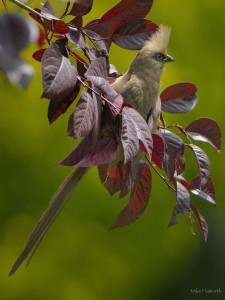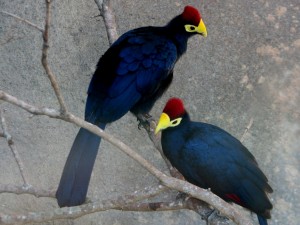Week 29 – 29 January 2017:
I Wonder if Mousebirds Hate Cat Stevens?
Providing for the needs of zoo animals involves much more than a suitable diet, adequate space, and proper veterinary care. Captives require an environment that is enriching. This is particularly true of birds and mammals that may develop behavioural problems in an impoverished environment. Stereotypic acts and self-harm are among the possible outcomes if individuals are not stimulated sufficiently, and in suitable ways.
As a consequence, zoos engage in programs of behavioural enrichment. To date most of these programs have been directed at mammals, particularly primates and carnivores that have particularly complex social behaviours in the wild. Less attention has been paid to the value of enrichment efforts for birds, even though birds and mammals often share the same zoo enclosures.
Recently the Buffalo Zoological Gardens in Buffalo New York studied the value of acoustic enrichment on their captive gorillas. Lindsay Robbins and Susan Margulis of Canisius College in Buffalo took the opportunity to study the responses to enrichment of three species of birds that shared the gorilla exhibit. These were a pair of Lady Ross’s Turacos, two Spectacled Mousebirds, and a Superb Starling. All of these birds are native to Africa.
Over a period of weeks, behaviours of the birds in silent control periods were compared to their behaviours during three acoustic experiences. The first was playback of a compact disk called “Sounds of the African Rainforest.” The second experience involved an assortment of compositions by the classical composer Frédéric Chopin. Finally the birds (and gorillas) were observed during playback of music by the British rock band Muse. That band was chosen because their music contained “no vulgar language or loud, cacophonous sounds.”
Robbins and Margulis documented that nature sounds caused an increase in the amount of flying by members of all three bird species. In terms of flying, the Starling seemed to like Chopin, but none of the birds was keen on Muse. Rock music caused both the starling and mousebirds to vocalize less, but resulted in a significant increase in the performance of vocal duets by the turacos. The researchers concluded that acoustic enrichment of this sort may have a positive benefit on birds held as captives in zoos, without adding substantially to the work load of keepers.
Muses’ 2015 album, Drones, won a Grammy Award for Best Rock Album. They will be headlining at music festivals in Leeds and Reading later this year.
Robbins, L., and S. W. Margulis. 2016. Music for the birds: effects of auditory enrichment on captive bird species. Zoo Biology 35:29-34.
Photo credits: Spectacled Mousebird, photograph © Mike Haworth – howieswildlifeimages.com/2014/11/26/mousebirds/; Lady Ross’s Turacos - www.zoochat.com



